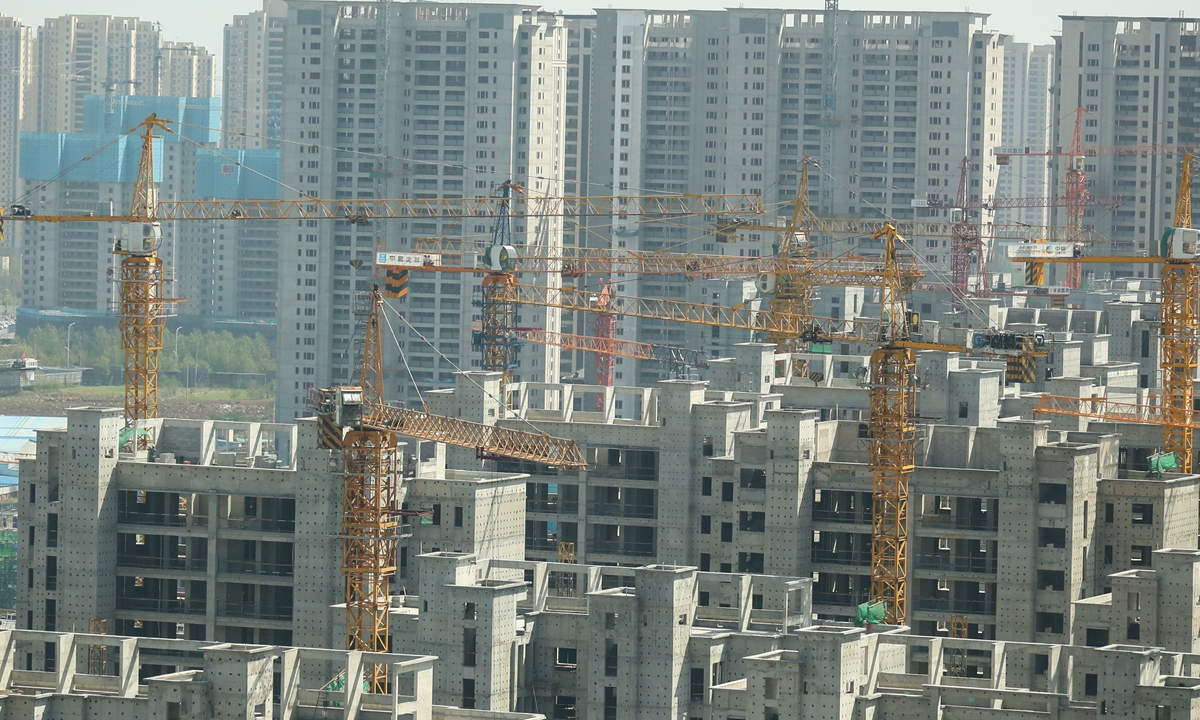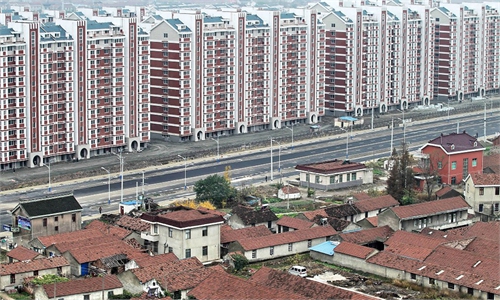
A housing project under construction Photo: cnsphoto
Multiple cities in China have recently announced plans to help solve problems in the real estate industry, including setting up working groups and organizing meetings, after mortgage default risks raised concerns in recent weeks. Some unfinished and stalled housing projects are reportedly resumed construction.
Xianyang in Northwest China’s Shaanxi Province was among the latest cities to tackle housing problems.
According to an announcement published online by the Housing and Urban-Rural Development Bureau of Xianyang on Tuesday, the bureau has summoned some real estate developers in a collective meeting.
An assistance policy has been released at the meeting, with departments of the bureau working together with designated real estate enterprises to ramp up the construction of houses and enable developers to deliver projects to buyers on time, under the premise of ensuring quality and safety.
According to a homebuyer in Shaanxi’s Xi’an, progress has been made recently on a formerly stalled housing project, starting with the facade.
On Wednesday, a homebuyer told online news outlet Yicai that “the developer promised the city government and property owners it will resume work on July 25 and deliver the apartments on November 30.”
The project was originally scheduled for delivery on November 30, 2021 but was delayed to July 30, 2022 after complaints that the developer had misappropriated regulatory funds, halting the construction of the high-rise buildings.
Other cities, including Ningbo in East China’s Zhejiang Province, Suining in Southwest China’s Sichuan Province, Luoyang, Zhumadian and Pingdingshan in Central China’s Henan Province, have released similar measures to tackle housing problems and mainly address unfinished or stalled housing projects.
Several cities in Central China's Henan Province have announced plans to set up working groups and have organized meetings to address unfinished or stalled housing projects, after mortgage default risks raised concerns in recent weeks.
On Tuesday, the Housing and Urban-Rural Development Bureau of Pingdingshan city, Henan Province, said in a statement on its official website that the city held a special meeting to address the "problematic property projects" on July 15.
According to the statement, the meeting centered on the major task of ensuring housing delivery to homebuyers, and in-depth discussion was conducted on matters such as project resumption, fund-raising to help resolve the "problematic projects" within the city.
Pingdingshan authorities said they will adopt an approach of "one policy for one single project", and further optimize and improve the solution plan for the unfinished or stalled housing projects.
Apart from Pingdingshan, relevant work is going on in Henan's Zhengyang county, which also held working meetings on Sunday and vowed to figure out individualized solutions for the problematic projects there.
Gongyi, another medium-size city in Henan, announced on July 14 that all of the three stalled real-estate projects in the city had been "properly resolved."
Local authorities said that the city quickly established a special working group for solving the problem, and has guided three property developers to undergo bankruptcy proceedings.
The accelerated moves by local authorities come as mortgage defaults in some Chinese cities, including those in South China's Guangdong Province and Central China's Henan and Hunan provinces, have raised concerns at both home and abroad.
Chinese regulators came out with detailed guidance this week to help address mortgage defaults. Experts stressed that such cases are unlikely to cascade into large-scale systemic risks for China's banking system, whose risk management mechanisms are generally deemed strong enough to withstand the risk.
Since 2019, there have been some defaults in the real estate market, which has given enough time for the regulators and financial institutions to manage the risks.
The government-led market-oriented restructuring of defaulted real estate companies will not cause market panic or the spread of risks, ANBOUND, a multinational independent think tank, said in a research note it sent to the Global Times.
While the think tank called for more "precise" guidance and management of problematic property firms, addressing the problem faced by some defaulted developers in a timely manner is likely to revitalize the housing market of the world's second-largest economy quickly, experts said.
Global Times



